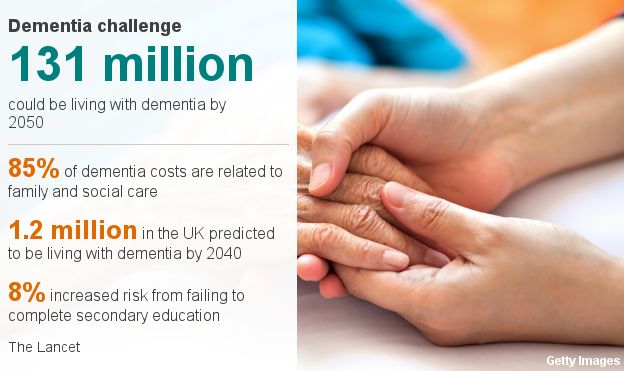Nine lifestyle changes can
reduce dementia risk, study says
One in three cases of
dementia could be prevented if more people looked after their brain health
throughout life, according to an international study in the Lancet.
It lists nine key risk
factors including lack of education, hearing loss, smoking and physical inactivity.
The study is being
presented at the Alzheimer's Association International Conference in
London.
By 2050, 131 million
people could be living with dementia globally.
There are estimated to be
47 million people with the condition at the moment.
Nine factors that
contribute to the risk of dementia
Mid-life hearing loss - responsible for 9% of the risk
Failing to complete secondary education - 8%
Smoking - 5%
Failing to seek early treatment for depression - 4%
Physical inactivity - 3%
Social isolation - 2%
High blood pressure - 2%
Obesity - 1%
Type 2 diabetes - 1%
These risk factors - which
are described as potentially modifiable - add up to 35%. The other 65% of
dementia risk is thought to be potentially non-modifiable.
Although dementia is
diagnosed in later life, the brain changes usually begin to develop years
before," said lead author Prof Gill Livingston, from University College
London.
"Acting now will
vastly improve life for people with dementia and their families and, in doing
so, will transform the future of society."
The report, which combines
the work of 24 international experts, says lifestyle factors can play a major
role in increasing or reducing an individual's dementia risk.
It examines the benefits
of building a "cognitive reserve", which means strengthening the
brain's networks so it can continue to function in later life despite damage.
Eve Laird, from Dumfries,
is worried about dementia because her mum is living with the condition.
She has decided to make
some changes to her lifestyle.
"I'm terrible for eating processed foods and
takeaways and I've really been trying to cut back on that.
"I definitely drink a lot more water than I used
to - and I don't drink as much coffee now.
"I actually took part in the Edinburgh marathon.
For that I joined the Dumfries running club - I go there once a week."
She says she felt so much better for the exercise, and
for improving her diet.
"I felt a lot healthier and mentally sharper as
well. It's something I'd really like to continue, but it is hard to stay on
track."
"I just think the small changes can make such a
big difference."
Failure to complete secondary
education was a major risk factor, and the authors suggest that individuals who
continue to learn throughout life are likely to build additional brain
reserves.
Another major risk factor
is hearing loss in middle age - the researchers say this can deny people a
cognitively rich environment and lead to social isolation and depression, which
are among other potentially modifiable risk factors for dementia.
Another key message from the report is that what is
good for the heart is good for the brain.
'Positive changes'
Not smoking,
doing exercise,
keeping a healthy weight,
treating high blood
pressure and diabetes can all reduce the risk of dementia, as well as
cardiovascular disease, and cancer.
The researchers say they
did not have enough data to include dietary factors or alcohol in their
calculations but believe both could be important.
Dr Doug Brown, director of
research at Alzheimer's Society, said:
"Though it's not
inevitable, dementia is currently set to be the 21st Century's biggest killer.
We all need to be aware of the risks and start making positive lifestyle
changes."
Dr David Reynolds, chief
scientific officer at Alzheimer's Research UK, said: "Alongside prevention
research, we must continue to invest in research to find a life-changing treatment
for people with this devastating condition."

No comments:
Post a Comment